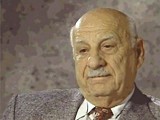You searched for: jewish
<< Previous | Displaying results 2421-2430 of 2501 for "jewish" | Next >>
-
Norbert Wollheim describes a roundup of Jews in Berlin
Oral HistoryNorbert studied law and was a social worker in Berlin. He worked on the Kindertransport (Children's Transport) program, arranging to send Jewish children from Europe to Great Britain. His parents, who also lived in Berlin, were deported in December 1942. Norbert, his wife, and their child were deported to Auschwitz in March 1943. He was separated from his wife and child, and sent to the Buna works near Auschwitz III (Monowitz) for forced labor. Norbert survived the Auschwitz camp, and was liberated by US…
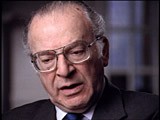
-
Henny Fletcher Aronsen describes living conditions in the Kovno ghetto
Oral HistoryHenny was born into an upper-middle-class Jewish family in Kovno, Lithuania. She and her brother attended private schools. In June 1940 the Soviets occupied Lithuania, but little seemed to change until the German invasion in June 1941. The Germans sealed off a ghetto in Kovno in August 1941. Henny and her family were forced to move into the ghetto. Henny married in the ghetto in November 1943; her dowry was a pound of sugar. She survived several roundups during which some of her friends and family were…
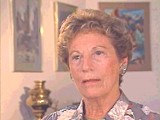
-
Chaim Engel describes arrival in Sobibor
Oral HistoryIn 1939, as Chaim's tour in the Polish army was nearing its scheduled end, Germany invaded Poland. The Germans captured Chaim and sent him to Germany for forced labor. As a Jewish prisoner of war, Chaim later was returned to Poland. Ultimately, he was deported to the Sobibor camp, where the rest of his family died. In the 1943 Sobibor uprising, Chaim killed a guard. He escaped with his girlfriend, Selma, whom he later married. A farmer hid them until liberation by Soviet forces in June 1944.
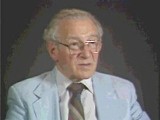
-
Charlene Schiff describes her liberation by Soviet troops
Oral HistoryBoth of Charlene's parents were local Jewish community leaders, and the family was active in community life. Charlene's father was a professor of philosophy at the State University of Lvov. World War II began with the German invasion of Poland on September 1, 1939. Charlene's town was in the part of eastern Poland occupied by the Soviet Union under the German-Soviet Pact of August 1939. Under the Soviet occupation, the family remained in its home and Charlene's father continued to teach. The Germans…
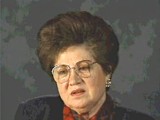
-
Norbert I. Swislocki describes leaving Warsaw with his mother upon the outbreak of war
Oral HistoryNorbert was 3 years old when Germany invaded Poland in September 1939. He and his mother were in Warsaw; his father had been drafted into the Polish army and later ended up in Vilna. Norbert and his mother set out to join him and the family was reunited after a few months. After the family had been in Vilna for about a year, Norbert's father was able to obtain visas for Curacao in the Dutch West Indies and visas for transit through Japan. Norbert and his parents left Vilna in January 1941, and arrived in…
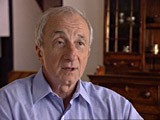
-
Herbert A. Friedman describes finding two child survivors after liberation
Oral HistoryHerbert graduated from Yale in 1938. He became a rabbi and worked very closely with American Jewish leader Stephen S. Wise. He became a chaplain in the US Army during World War II. In the spring of 1945, he went to Europe. When the war ended, he was recruited by David Ben-Gurion into the Aliyah Bet ("illegal" immigration) operation of the Hagana. This involved smuggling Jews from eastern Europe through Germany to Palestine. He worked with displaced persons, mainly in Berlin and the American zone of…
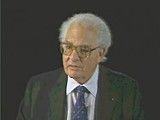
-
Lucine Horn describes obtaining false papers to assume the identity of an "Aryan" outside the Warsaw ghetto
Oral HistoryLucine was born to a Jewish family in Lublin. Her father was a court interpreter and her mother was a dentist. War began with the German invasion of Poland on September 1, 1939. Lucine's home was raided by German forces shortly thereafter. Soon after the German occupation of Lublin, Jews there were forced to wear a compulsory badge identifying them as Jews. A ghetto in Lublin was closed off in January 1942. Lucine survived a series of killing campaigns and deportations from the ghetto during March and…
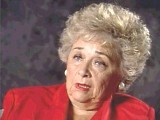
-
Cecilie Klein-Pollack describes survival with her sister in Auschwitz
Oral HistoryCecilie was the youngest of six children born to a religious, middle-class Jewish family. In 1939, Hungary occupied Cecilie's area of Czechoslovakia. Members of her family were imprisoned. The Germans occupied Hungary in 1944. Cecilie and her family had to move into a ghetto in Huszt and were later deported to Auschwitz. Cecilie and her sister were chosen for forced labor; the rest of her family was gassed upon arrival. Cecilie was transferred to several other camps, where she labored in factories. Allied…
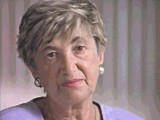
-
Cecilie Klein-Pollack describes mother's actions to save Cecilie's sister's life upon arrival at Auschwitz
Oral HistoryCecilie was the youngest of six children born to a religious, middle-class Jewish family. In 1939, Hungary occupied Cecilie's area of Czechoslovakia. Members of her family were imprisoned. The Germans occupied Hungary in 1944. Cecilie and her family had to move into a ghetto in Huszt and were later deported to Auschwitz. Cecilie and her sister were chosen for forced labor; the rest of her family was gassed upon arrival. Cecilie was transferred to several other camps, where she labored in factories. Allied…
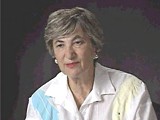
-
Aron (Dereczynski) Derman describes deportations from the Grodno ghetto in November 1942
Oral HistoryAron was born to a middle-class Jewish family in Slonim, a part of Poland between the two world wars. His parents owned a clothing store. After studying in a technical school, Aron worked as a motion-picture projectionist in a small town near Slonim. The Soviet army took over Slonim in September 1939. War broke out between Germany and the Soviet Union in June 1941. Aron returned to Slonim. The Germans soon occupied Slonim, and later forced the Jews into a ghetto. Aron was forced to work in an armaments…
